1984: Realizing a dark take on the future
Big brother is watching you!
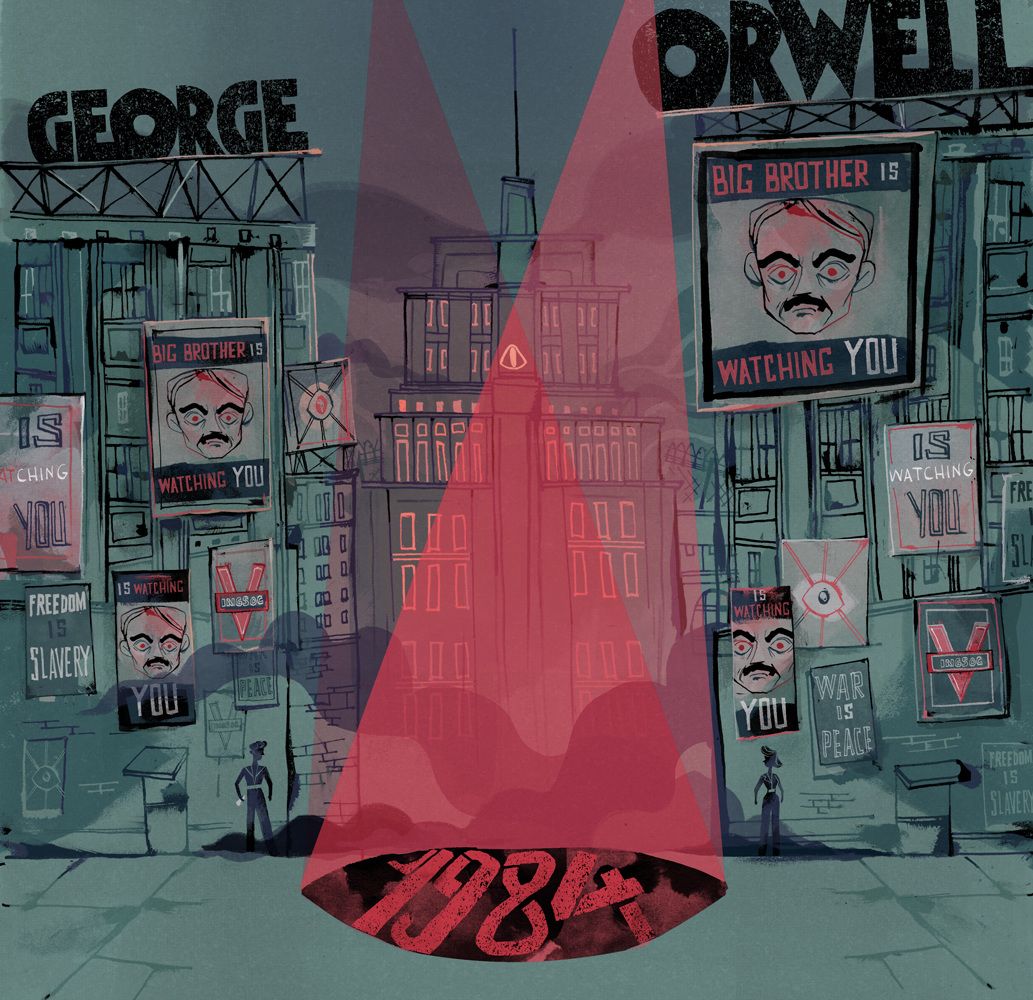
Contains spoilers for the book, 1984. Proceed with caution!
I picked up 1984 unwittingly just because it was resting on my bookshelf for too long. It was one of those must-read famous books that I had a few associations about: Big Brother, the Apple Mac ad and a state under complete surveillance. I had expected life elaborated under a surveillance state, a broad overview but what I found was more grounding and terrifying.
The opening sets the scene following Winston, a member of the Party, who works for the Ministry of Truth, as he contemplates the current situation. Winston was in his apartment overlooking the city of London, chief city of Airstrip One, a province of Oceania (Oceania, Eastasia and Eurasia are the three great superstates of the world). As Winston looks out his window at his place of work in the distance and the posters of Big Brother with the slogan "Big Brother is watching you" plastered up on surrounding buildings, we get a look the world and it's restrictions through his eyes. Even his apartment is not safe and his every action is monitored by a telescreen. There is no such thing as privacy. It feels suffocating.
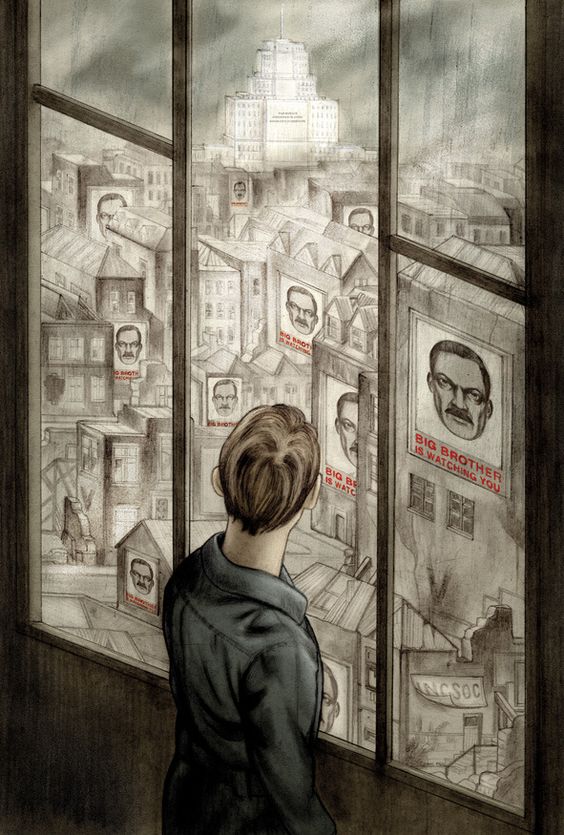
As Winston proceeds to write in his diary, an action which he debates quite a bit as it may get him into trouble, maybe even leading to certain death, he thinks of a world before the surveillance state and wonders if there was such a time. He thinks back to the day he had picked up the journal in a junk shop. He had gone for a walk in the proles district, forgoing his participation at the community center. Even as he makes his way through, he is afraid of getting caught by passing patrols. A simple walk through the lower districts seem to be an act of courage. In this, we can ascertain the extent to which the world has changed.
Newspeak
Newspeak is the language of Oceania that is used to communicate the message of the Party. The key attribute of this language is that it has limited vocabulary. if you do not have the words, how will you be able to think differently. By controlling the language, they control the thinking process. If you can not put a name to it, you will not be able to grow the thought.
Thoughtcrime
With every action monitored, no matter where you are, you have to conscious of your every thought. Thinking is a crime, esp. if it is something rebellious, labelled as thoughtcrime. Thoughtcrime IS death. No matter how much you keep control of your thoughts, you are bound to slip up. Even one wrong word in your sleep and you were doomed. This helps clip any rebellious thought in the bud. Before you can convert your thought into action, you are captured and vaporized.
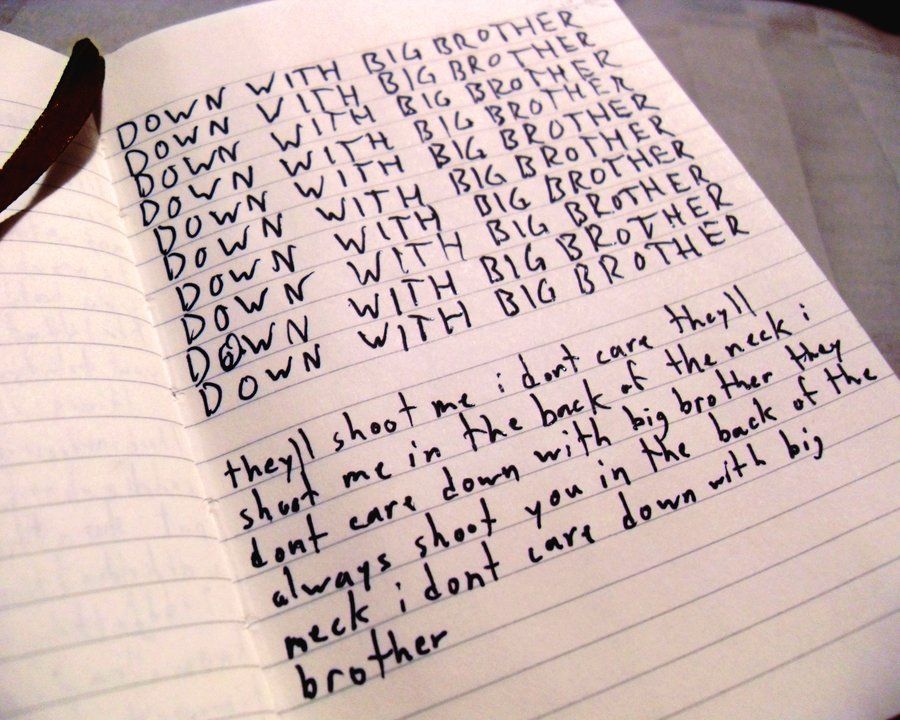
It is a strange thing to keep control of your thoughts. We do it on a daily basis by the white lies we tell, but at some point or another, it always leaks out. There are cracks in our armor through which our thoughts seep through. It is tough to imagine living in a world where thinking is a crime.
Two Minutes Hate
Then, there is the Two Minutes Hate, which is a presentation of the condemning of crimes against the state. It varies day by day but always features Emmanuel Goldstein, Enemy of the People and the army of the enemy superstate marching against the home. This presentation finishes with Big Brother promising to protect the citizens and take care of the threats.
The agenda of the presentation seems to be to rile people up and get them to focus their hate. It seems easier to make people hate a constant villain along with a superstate, with a colossal army marching right up to their doorstep. Hate keeps the energy of the group focused. Then showing the savior in the Big Brother gives people hope and a person to put their respect and trust in.
Hate surrounds us everywhere, on the internet, in the news, on social media. Somehow, the controversy rises to the top and is talked about much more than positive developments. This appeals to our human nature and gives us a chance to express our worst selves esp. in the anonymity of the internet. Just like the cream rises to the top, the hate comes up and propagates through while acts of kindness fade away. We do not have such a focused day to day presentation and yet, social media seems to serve that purpose in focusing and kindling our dark sides.
There is no family
Through Winston's neighbor, we are shown that right from upbringing, the state controls the education of children through organization such as Spies, readying them to even betray their parents for any wrong thought. It is right from the upbringing that children are conditioned to think in a certain way.
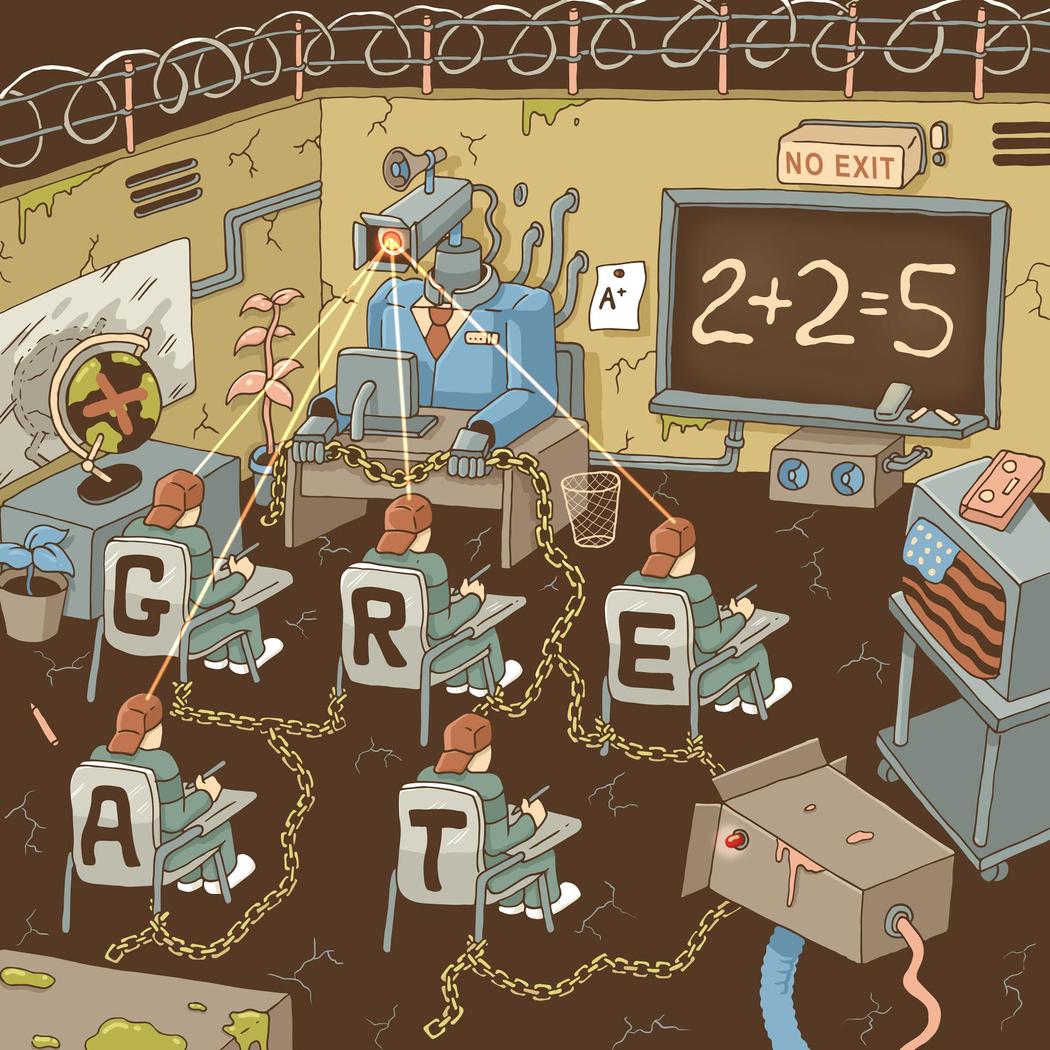
This further is an illustration of the time with family turning against family and yet state emphasizes the safeguarding figure as Big Brother, an application of doublethink.
Proles
There is the Party, which is divided to Outer Party members and Inner Party members. Outside of the Party, the common people, who do all the menial jobs and provide the labour, are the proles. They seem free of the constant surveillance that the Party members have to undergo and yet the media they consume is controlled by the Party. Winston believes that the hope of rebellion and change lies with the proles. All they need is to be educated and then they can rise up.
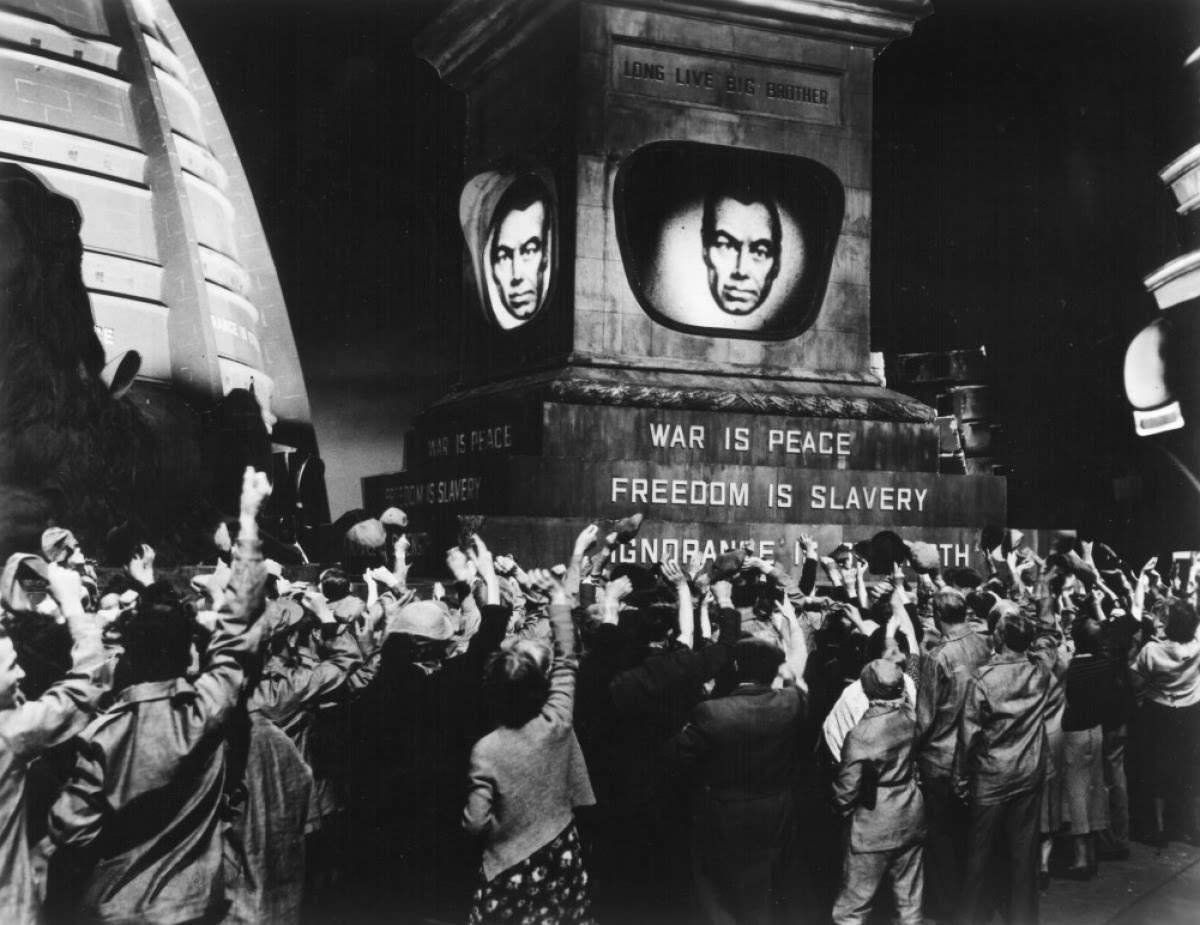
However, the Party being as powerful as it is controls the flow of information and rations to the proles. By keeping them less educated, engaged in the daily grind and spinning a narrative of a much harsher past, they do not give the proles an opportunity to think about their situation. By lack of understanding, they remained sane and never fully grasped the enormity of what was going on around them.
It is interesting to observe that when we get engaged in the daily grind of things, we do not feel the need to rise up and question. It is only when we are too pressured or if we have too much free time, that our mind rebels. But by controlling the flow of our thoughts, we can be brought to heel.
Doublethink
The world is characterized by attributes that illustrate the core philosophy of "Reality Control" or as it is called in Newspeak, doublethink. Doublethink as explained by Orwell:
“To know and not to know, to be conscious of complete truthfulness while telling carefully constructed lies, to hold simultaneously two opinions which cancelled out, knowing them to be contradictory and believing in both of them, to use logic against logic, to repudiate morality while laying claim to it, to believe that democracy was impossible and that the Party was the guardian of democracy, to forget whatever it was necessary to forget, then to draw it back into memory again at the moment when it was needed, and then promptly to forget it again: and above all, to apply the same process to the process itself -- that was the ultimate subtlety: consciously to induce unconsciousness, and then, once again, to become unconscious of the act of hypnosis you had just performed. Even to understand the word 'doublethink' involved the use of doublethink.”
Simply put, doublethink means the power of holding two contradictory beliefs in one's mind simultaneously, and accepting both of them.
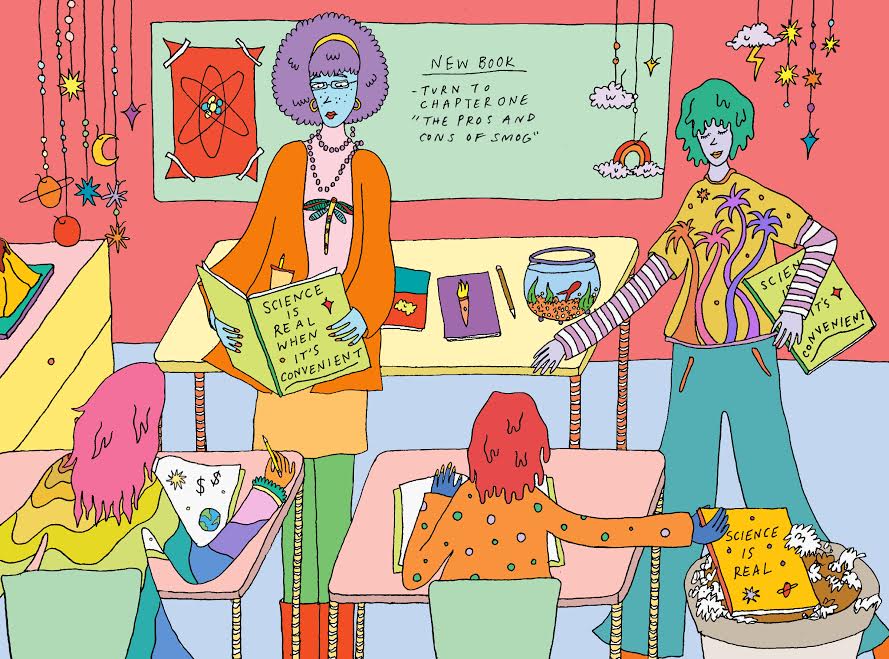
There are hints of doublethink dotted in everything the party does. They retain control of power by altering the memories of events, both past and present. Even their slogans reflect this. It is like hiding in plain sight, hidden and yet visible. The Party maintains a level of hypocrisy in all their actions, including manipulating predictions made in the past to match the actual reports in the present. They are always right, always have been, always will be.
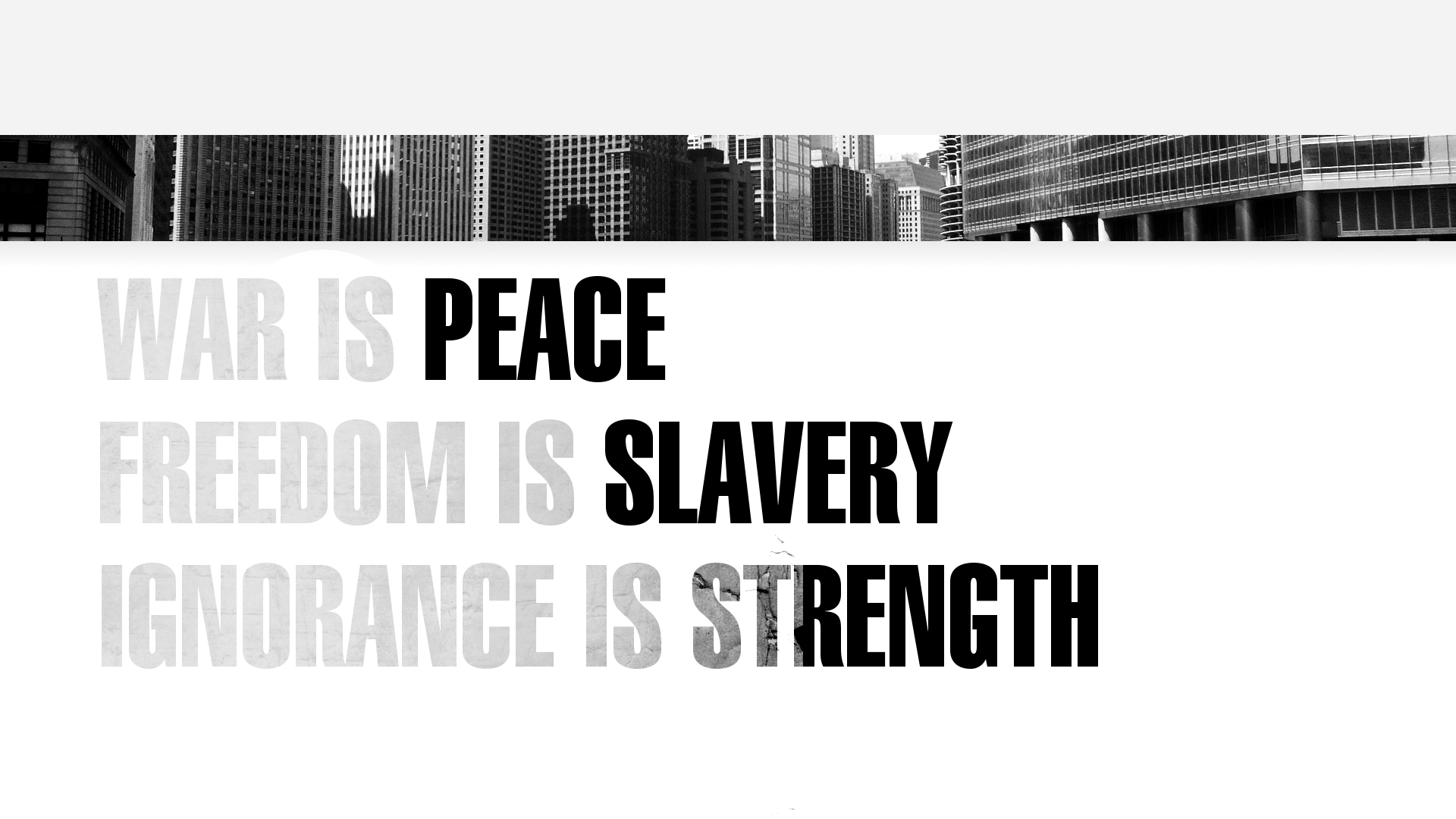
Doublethink is also reflected in the purpose of the for main ministries in Oceania.
- The Ministry of Truth, which concerned itself with lies through news, entertainment, education, and the fine arts.
- The Ministry of Peace, which concerned itself with war.
- The Ministry of Love, which maintained law and order, but concerned itself with torture.
- The Ministry of Plenty, which was responsible for economic affairs, concerned itself with starvation.
These contradictions in the function of the Ministries are not accidental, nor do they result from from ordinary hypocrisy: they are deliberate exercises in doublethink.
The Mutability of the Past
"Who controls the past, controls the future, Who controls the present, controls the past." Yet the Party claimed that the past never has been altered. Whatever was true now was always true. However, current records were constantly being altered to reflect events of the present to the past. This was Winston's job in the Ministry of Truth, validated and re-validated by his seniors.
The past had not been merely altered, but had been actually destroyed. Even the most obvious fact cannot be established if there was no record outside of our memory. Since the Party had control of records, they made sure to have all of them modified to reflect the current truth.
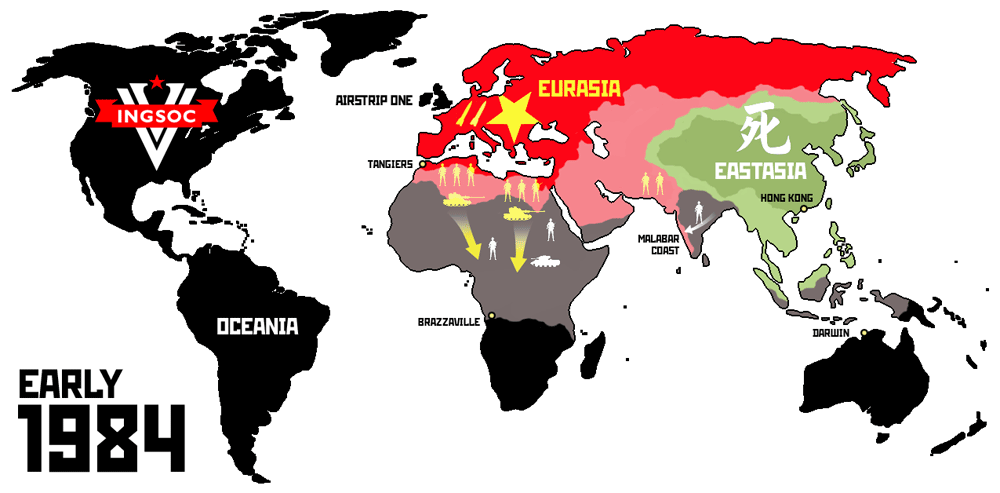
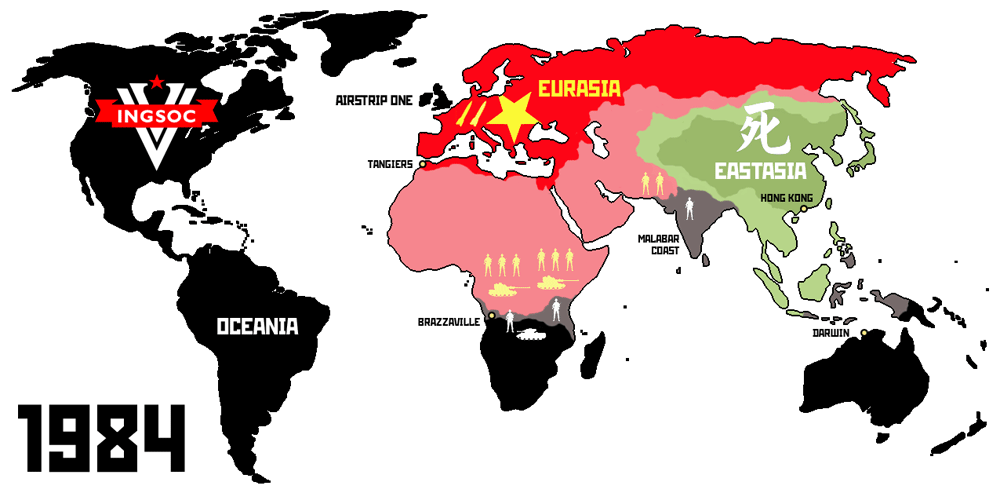
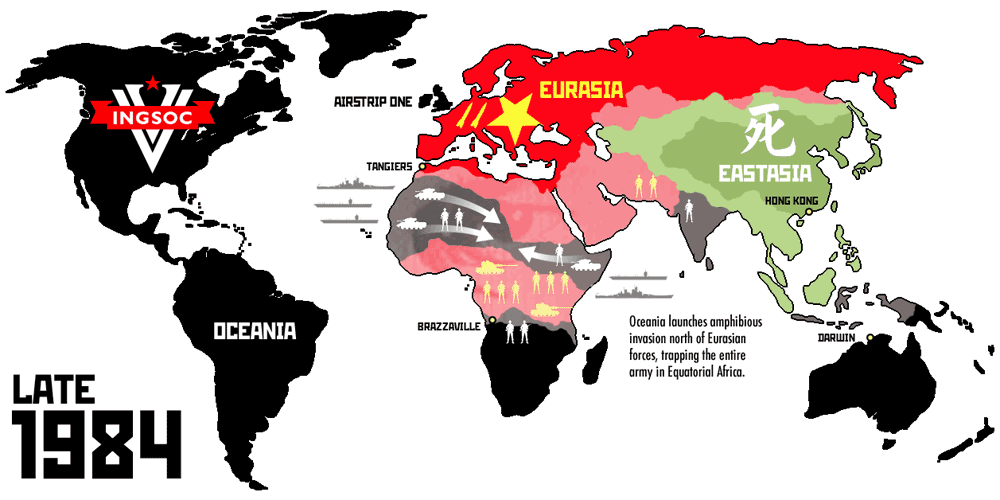
Oceania was in war with Eurasia. Oceania was always at war with Eurasia. They had never been in alliance even though Winston remembers of a time when they were in alliance. As the records reflect the war and not the alliance, both in the present and the past, there was never an alliance.
"In memory. Very well, then. We, the Party, control all records, and we control all memories. Then we control the past, do we not?"
It is an interesting thing to think about, where if wasn't for all the media and the books and the internet, it would only be our memory that served as a establishing point for any fact. If our memory can be altered, we could me made to believe in the impossible. Even now, when we look back at our history, we see stories written by the victors. But what of the other side? We believe only what we are shown. Records can be altered to change the fact.
Love
Even through all these restrictions, Winston finds love in Julia (or more like she finds him). They can never be together as the Party does not allow people to get married if they are in love. In fact, the Party does not allow any kind of emotion in marriage. The duty of a couple is only to procreate.
Winston and Julia have a secret affair, setting up secret out of the way meeting spots to make love. However, right from the start, they knew that their choice was going to doom them. They knew that this would lead to certain death and yet they enjoyed their love in each other.
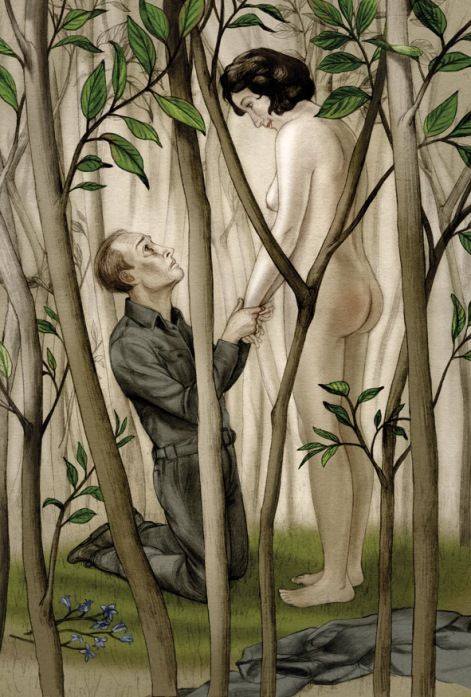
There is a certain hope in their love. Surely if they can hold out when the time comes, they will get a chance to be together when the world changes. As expected, the lovers get caught in the act. We see the true extent of the torture that they are put through, when they choose to give up each other to save their own selves. After all, what is the price of another's life over your own?!
The Theory and Practice of Oligarchical Collectivism
The book details the principles upon which the Party has been founded. This is one of the most interesting parts of 1984. You get a deeper look at the system behind the entire world at large and the tenets that keep the Party in power and how they have been implemented.
The limitations on the rations, the sub-standard food (they do not even have real Coffee), restrictions on love and thought all are done to keep the Party members at the edge of discomfort. When their desires are not satisfied, the pent-up energy is focused into hate. Stoking the fires of Hate keep the people from ever being satisfied increases the importance if small privileges.
As we begin to understand how strongly rooted the principles of Ingsoc and the Party are and what has been done to keep power, essentially "freeze a moment in history".
"The war is waged by each ruling groups against its own subjects, and the object of the war is to keep the structure of society intact."
Everything was done to maintain a hierarchical society, with a clear distinction between the Inner Party members, the Outer Party members and the proles. This society was only possible on the basis of poverty and ignorance.
"If human equality is to be forever averted, the prevailing mental condition should be controlled insanity."
As we understand the depth at which the Party has gone to maintain power, the question rises as to how they can be brought down. But then all goes to hell. It seems the bedroom above the junk shop, which Winston and Julia used as a safe haven, was actually compromised and the owner of the shop, Mr. Charrington actually works for the party. This is how the lovers are entrapped.
O'Brien
We are introduced to O'Brien early on in the book when Winston sees him in the Two Minutes Hate and ascertains that O'Brien may also be an outlier. Later, he finds that O'Brien is actually a part of the rebellious group headed by Emmanuel Goldstein. Both he and Julia agree to join up. It is through him that they are given access to the book by the rebel leader. He even warns them that if they get caught he cannot do anything to get them out, only maybe provide them a way to swiftly end their lives.
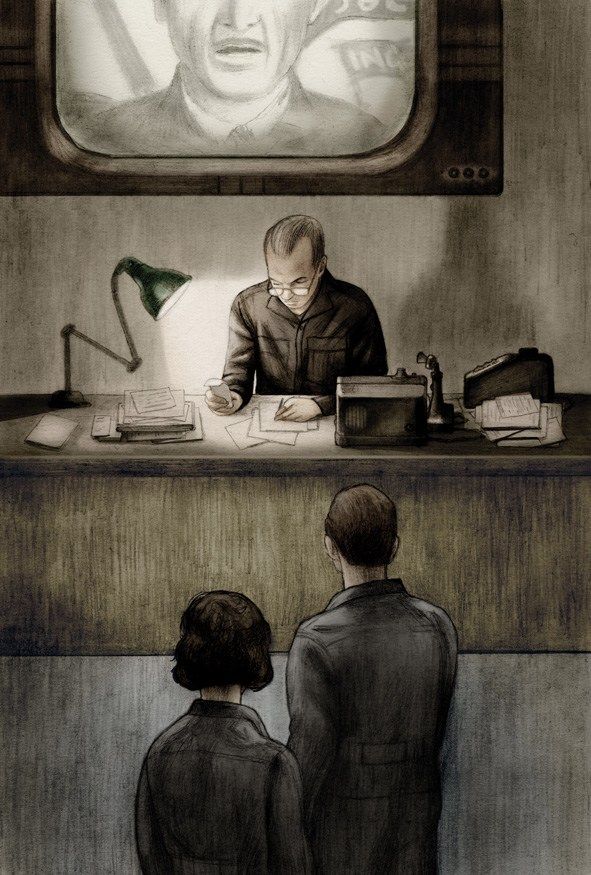
However, when the time does come that Winston is captured and he meets O'Brien again, it is a different scenario. O'Brien highlights the extent of power of the Party. He was always working for the Party. He elaborates that the Party is not just the Big Brother or any one person, but a group working towards the same aim: to retain power. The reason Winston is put through the entire process of torture is not for submission but for conversion. This is how the Party stayed in power. They did not stamp out the heretic, but converted him. He was to submit by his own choice.
“The command of the old despotisms was 'Thou shalt not'. The command of the totalitarians was 'Thou shalt'. Our command is 'Thou art'.”
O'Brien further explains that they wipe the people clean so what is only left is the shell of the person and his love for Big Brother. Over the course of the next few weeks, Winston undergoes the torture that finally ends with the most extreme moment that I said before where he betrays Julia.
"If you can feel that staying human is worthwhile, even when it can’t have any result whatever, you’ve beaten them."
The fact that even the narrative of the rebellion is given by the Party shows their true capability and extent to which they are ready to go to maintain power. In giving people hope and even spotting out the few liars, they prevent any heresy from growing into any rebellious thoughts they cannot control. Control the rebellion, you can control the recruitment. Control the recruitment and you can control the recruit.
Hope
Winston ends up broken and is released to an uncertain fate. One thing was sure: someday, as he had written in his journal, he would be shot in the back of his head. Until then, he had nothing to do but wait and live out the rest of his life. There is a moment when the news talks about the losses suffered by Oceania in the war at the African front and Winston has a thought that they maybe defeated, but no such luck.. Oceania attains a victory. The war may all just be a facade after all.
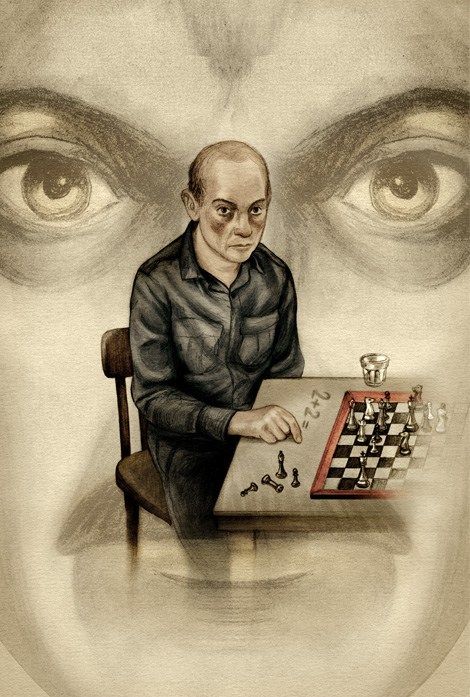
There, we find a man, who has resigned to his fate and now has his love for Big Brother. Power is power and the Party knows how to maintain it.
My final thoughts
I understand why this book was mandatory reading in some schools. My imagination seem to be much more on a fantasy plane with a rebellion and a fight ending with the fall of the Big Brother. But George Orwell paints a much more realistic picture of a darker world, where the High will do their worst to maintain power.
Orwell highlights an extreme take of a future, but I can't resist but draw a comparison to our world. It seems to be a much more subtle implementation of the retention of power in the world of today by the powers in control. A hierarchical society can be built only upon poverty and ignorance, both of which are rampant today. We may be the most connected in the history, with the most accessible means to knowledge and yet the most ignorant and easy to be controlled population. This is evident by how easy it is for our opinions to be swayed by social media.
How much do we take the freedom we have for granted? We can go anywhere, at any time of the day and yet we restrict ourselves, tied to our technology. Winston's world had no choice but to have telescreens monitoring each and every one of their actions. On the other hand, we voluntarily forgo our privacy for the constant need of recognition. Social media has penetrated our lives so well that we do not even realize the depth of how much we have lost.
I wonder at the invisible chains that have tied us down and trapped us in it's web (and on the web :)) while those in power work towards retaining their stronghold. 1984 was a great read and I would highly recommend it to everyone atleast to get the ball rolling on our thinking and bring us some awareness.
Have you read the book? What are your thoughts on it?
Illustrations for this article have been taken from the article about Folio society edition of 1984 and the Vice article on artists reimagining 1984.